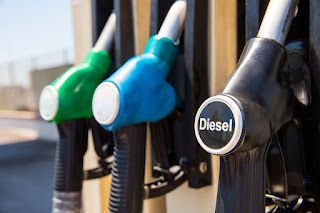London Leads the Charge: Diesel Fuel Sales Plummet, Signalling a Shift Towards Cleaner Air and Energy Security
In a significant revelation, recent analysis has unveiled a stark decline in diesel fuel sales in London compared to the rest of the UK. Over the past four years, sales have plummeted by nearly 40 percent in the capital, while other regions have only managed a decline of 20 percent. This data, analysed by Transport and Environment (T&E) UK using statistics from the Department for Energy Security and Net Zero, underscores the transformative impact of the Ultra Low Emissions Zone (ULEZ) in London.
The ULEZ, introduced in 2019, imposes charges on older, more polluting vehicles entering the city. This proactive measure has not only led to a substantial decrease in diesel dispenser use, but has also yielded marked improvements in air quality across London's roads. A new map tracking nitrous oxide levels between 2021 and 2022 illustrates these positive changes, reinforcing the government's acknowledgment of air pollution as the "largest environmental risk to public health."
Oliver Lord, UK head of the Clean Cities Campaign, hailed the progress in London as inspirational but emphasised the need for broader action. Lord stressed that until diesel engines are entirely phased out, true freedom from harmful emissions remains elusive. He called for unified commitment, coordination, and leadership at all levels of government to achieve nearly diesel-free cities by 2030, particularly emphasizing support for small businesses in this transition.
T&E UK advocates for the replication of low emissions zones across cities nationwide, citing the potential to enhance both energy security and trade dynamics. Cities like Sheffield, Liverpool, and Greater Manchester face nitrous oxide emissions exceeding legal limits, highlighting the urgent need for clean air measures. Introducing clean air zones in these areas not only promises health benefits for residents but also contributes to bolstering the UK's energy security.
Matt Finch, UK policy manager at T&E UK, emphasised the multifaceted benefits of clean air zones beyond their impact on air pollution. Beyond public health improvements, Finch highlighted the positive influence on energy and trade dynamics, particularly in reducing reliance on imported diesel fuel. Finch advocated for a swift transition towards utilising clean British electrons, echoing London's proactive stance and urging other regions to follow suit.
As diesel fuel sales continue to dwindle in London, the city emerges as a beacon of progress in the fight against air pollution and the pursuit of energy security. The success of initiatives like the ULEZ underscores the efficacy of targeted policies in driving tangible change. However, the journey towards cleaner air and sustainable energy requires collective action, innovative solutions, and unwavering commitment from policymakers, businesses, and citizens alike.
STOCK IMAGE




